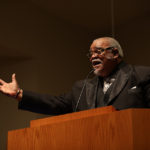The Bible tells the stories of women whom God used and who exercised spiritual leadership, but they are all-but-invisible when Scripture is viewed through patriarchal lenses, best-selling author Beth Allison Barr told a Christian community development gathering.
 Barr, professor of history at Baylor University and author of The Making of Biblical Womanhood: How the Subjugation of Women Became Gospel Truth, spoke to the No Need Among You Conference at First Baptist Church in Waco.
Barr, professor of history at Baylor University and author of The Making of Biblical Womanhood: How the Subjugation of Women Became Gospel Truth, spoke to the No Need Among You Conference at First Baptist Church in Waco.
Views about what the Bible teaches regarding women influence how Christians read familiar narratives such as the story of Hagar—the mother of Ishmael who had been enslaved by Abram and Sarai—recorded in Genesis 16.
Drastically different ways of reading the same Scripture passage illustrate “the impact of Christian patriarchy on not only women in our churches, but also how it trickles out to women in our communities,” Barr said.
Two contrasting approaches
She contrasted two approaches to interpreting the text based on the work of Wil Gafney and John Piper.
Gafney, professor of Hebrew Bible at Texas Christian University’s Brite Divinity School, reads Genesis 16 from the perspective of a Black woman theologian. Piper, an influential Reformed pastor-theologian and founder of the popular Desiring God online resource, views it from a complementarian viewpoint that promote the subordination of women.
Gafney “describes Hagar as a powerless enslaved child—raped, abused, afraid and alone,” Barr noted. “This shocking sequence of events is made even more shocking by the identity of the perpetrators—the man and woman chosen by God to become the parents of his chosen people.”
At the same time, Gafney also notes Sarai herself was a survivor of sexual violence and domestic abuse who was “pimped out” to Pharaoh in Egypt by her husband Abram “because he was afraid for his life.”
At the darkest point in the story of Hagar, Gafney notes, everything changes “because God sees her—an abused, friendless, enslaved child.”
Sign up for our weekly edition and get all our headlines in your inbox on Thursdays
“God sees her, and God acts, making her a promise that she will bear a son, and her descendants—just like the children of Abraham—will be too numerous to count,” Barr said.
In contrast, Piper focuses almost exclusively on the sin of Sarai, the impatience of Abram and the need to wait on God rather than follow human plans, she observed.
“Most of the resources—a combination of sermons, articles and blogs—don’t actually focus on Hagar,” she said.
In one resource, Piper uses “Sarai as an example of what happens when husbands’ and wives’ roles are reversed and the husband listens to the wife,” Barr said. “So that’s how he tells the story of Hagar. It’s because of the sin of Sarai in not submitting to her husband.”
While Gafney sees Hagar as a traumatized victim of abuse caught in a situation not of her own making, Piper barely sees Hagar, except as representative of what happens when people reject God’s plan, Barr observed.
‘Not seeing women’
“As a historian, one of the things I know is that a hallmark of patriarchy is centering men and not seeing women,” she said.
When men control the narrative, women often are minimized or ignored altogether, she noted.
“Not seeing women hurts women. It also hurts the church,” Barr said.
Patriarchal presuppositions blind readers to scriptural examples of women exercising leadership in churches, she noted, For instance, the Apostle Paul clearly did not intend to issue a blanket prohibition against women leading in churches, because he commended women like Phoebe, Junia and Priscilla.
“This is not revisionist history. No one is adding anything to the text. We’re just showing you what you haven’t seen because you have been looking through the lens of white masculinity,” Barr said.
One tragically high cost of not seeing women in Scripture and not allowing women’s voices to be heard is that women in churches are ignored when they report abuse, she said.
When men control the power structures and women are taught to submit to their authority without question, it allows abuse to continue, she asserted.
“God sees women,” Barr said. “Isn’t it about time the white evangelical world does, too?”














We seek to connect God’s story and God’s people around the world. To learn more about God’s story, click here.
Send comments and feedback to Eric Black, our editor. For comments to be published, please specify “letter to the editor.” Maximum length for publication is 300 words.